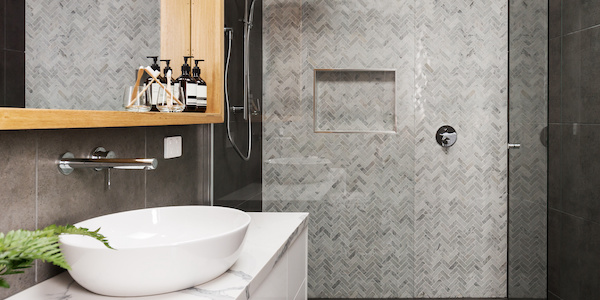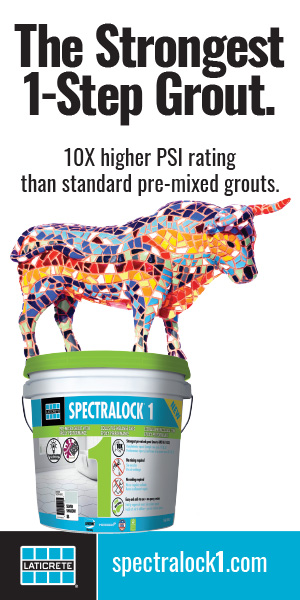Over their lifetime, consumers are faced with numerous big-ticket item (BTI) purchases, with number one being a home and number two being a vehicle. Beyond these two expenditures, a stall shower and/or bathroom remodel project may make the list as number three. Given the level of investment, common sense would direct the consumer to perform their due diligence when shopping for all the parts needed for a shower.
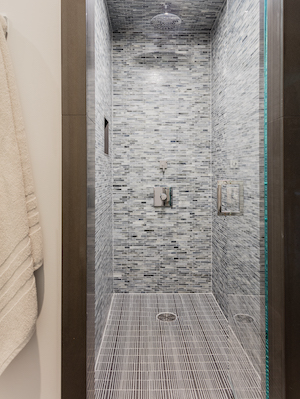
Successful showers for the most part result from the inclusion of a manufacturer’s shower “system” that often includes a warranty. The three key elements of a system are:
- A good standards-based plan
- Top-quality and appropriate materials
- A skilled and knowledgeable tile installer who is qualified and known as “Qualified Labor”
While there are other items and talents necessary to produce a shower that will stand the test of time, without these three, the project is more than likely going to fail.
Standards-based installation, methods, and best practices
The American National Standards Institute (ANSI) provides the following standards:
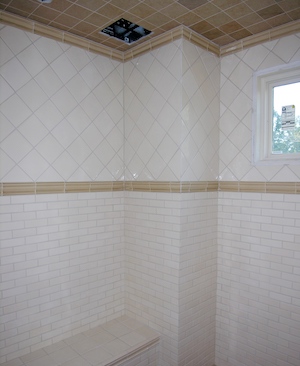

- A108.01-2.5.2 Ceramic tile installed with dry-set or latex-portland cement mortar
- A108.01-section 2.5.3.1 Suitable backings: Prepared suitable backings include plumb and true masonry, concrete, lean portland cement mortar and cured portland cement mortar (cured conventional setting beds), cementitious backer units, brick, ceramic tile, marble, and dimension stone, and in dry areas only, gypsum board.
- A108.01-section 2.5.3.2 Other backings: On all other solid backing surfaces for walls and ceiling, specify membrane, metal lath, and a portland cement mortar bed or cementitious backer units. Solid wall surfaces in dry locations may be covered with gypsum board.
- A108.5 Setting of Ceramic Tile with Dry-Set Cement Mortar
- A108.13 Installation of Load Bearing, Bonded, Waterproof Membranes for Thin-Set Ceramic Tile and Dimension Stone
The Tile Council of North America (TCNA) Handbook for Ceramic, Glass and Stone Tile Installation has a wealth of direction in shower construction depending on the materials selected. Here is an abbreviated list, but there are many others that may meet a particular need.
- B414 Mortar Bed Walls and Floor
- B441 Mortar Bed Walls (One Coat Method) and Mortar Bed Floor
- B415 Cement Backer Board or Fiber Cement Backer Board Walls and Mortar Bed Walls
- B422 Solid Backing, Bonded Waterproof Membrane, and Integrated Bonding Flange Drain
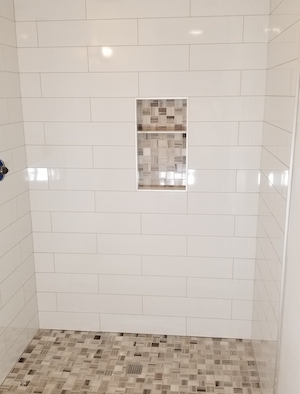

Quality materials and manufacturer’s system warranties
Using the best-quality products that fall within the consumer’s budget is paramount for a successful shower installation. Many times, lower cost products may save money on the front end, but they end up costing more due to replacement charge for items that were not designed for their intended purpose.
If the project is directed by an architect or engineer, the required products for the project are listed on the plans or in the specifications. However, if the project does not have specifications in place, many times these decisions are made jointly by the designer, the consumer, and the tile provider. The issue here is that these folks may not have the expertise required to design a water-tight shower compartment. A qualified/certified and knowledgeable tile installer is needed to provide guidance during the selection phase of the project.
It’s wise to use materials from a vertical company, one that offers the majority – if not all – the installation materials. This way the installer has written instructions on how the materials are to be applied and installed. For instance, the company may provide a system of floor preparation materials, ANSI A118.10 waterproofing and/or A118.12 crack isolation products, the appropriate bonding mortar or adhesive, grout, and color-coordinating 100% silicone sealant. Additionally, this group of materials, when installed per the manufacturer’s written instructions, will provide a performance warranty which boosts consumer confidence.
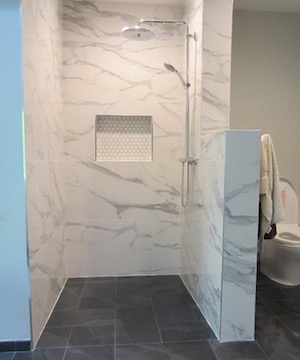

Qualified Labor
The “Installer and Contractor Qualifications Guide” found in the Tile Council of North America (TCNA) Handbook in part states: ”A home or any building today is one of the few things still made entirely ‘by hand’ and every aspect of a tile installation relies on the tile contracting company and its installers. How good the finished installation looks, how well it performs, and how long it lasts are in their hands. It is for this reason that the Handbook Committee and the Tile Council of North America strongly recommend hiring tile installation professionals who have demonstrated their commitment to their craft and taken the time to stay current with the latest materials and methods. Because tile is a permanent finish, the lowest bid should not be the driving factor, but rather who is the most qualified to perform the scope of the work specified.
“Pools, exterior facades, mortar beds, shower pans, steam showers, and other potentially complex installations, require different skills,” it continues. “Matching installer ability to the project at hand requires close evaluation of their experience, training, state licensing (where applicable), and certifications/credentials (where applicable). The Ceramic Tile Education Foundation (CTEF) provides a Contractor Questionnaire that can be used to aid in evaluating and comparing contractors (www.ceramictilefoundation.org).
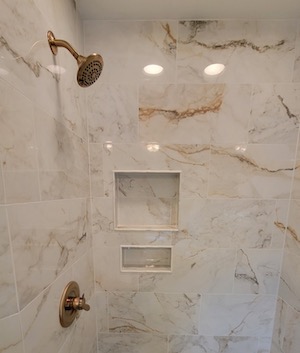

“Advanced Certifications for Tile Installers (ACT): ACT is an evaluation and certification program for tile installers in advanced, specific skills areas: large-format tile installation and substrate preparation, mortar (mud) beds for walls, mortar (mud) beds for floors, shower receptor [Handbook methods B415, B421, and B421C], (waterproof shower pan membrane, mortar bed and mortar curb) installation, membrane (both sheet and liquid) applications, grouting, and installation of gauged porcelain tiles (GPT) and gauged porcelain tile panels/slabs,” it concludes. “To pass an ACT test module, an installer must demonstrate hands-on proficiency and specific knowledge. Only installers who have already passed the Certified Tile Installer (CTI) test or those who are recognized by the U.S. Department of Labor as Journeyman Tile Layers may register for ACT testing.”
When possible, use materials from one manufacturer. Systems work and most times provide a warranty that can deliver great value to your clients.
For a shower to be successful, the basic principle is simple. Get the water from the shower head(s) to the drain(s) without compromising the walls and/or floor in between. While this is an over-simplification, of the shower plan, when materials and installation meet industry standards and best practices, the shower will provide a long-term value to the consumer.


Scott Carothers
Scott Carothers is the Acdemic Director for the Ceramic Tile Education Foundation (CTEF) and is responsible for the creation of the Certified Tile Installer (CTI) program, and is involved in the creation of the Advanced Certifications for Tile Installers (ACT) program as well as providing training to others in the tile industry.
Carothers has been involved in the ceramic tile industry for nearly 40 years and was the owner of a successful retail and installation firm prior to CTEF. He has served as President and Chairman of the Board of the National Tile Contractors Association (NTCA), Chairman of the NTCA Technical Committee, was named the NTCA Tile Person of the Year in 2005, and the NTCA Ring of Honor recipient in 2013. He is a voting member of the ANSI and the TCNA Handbook committees.


